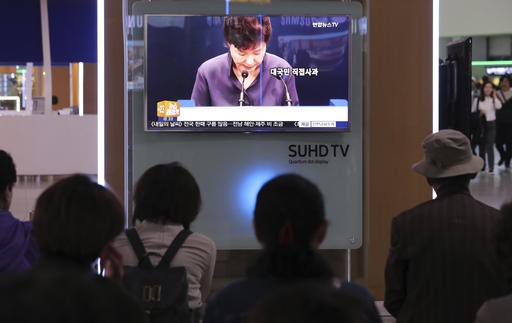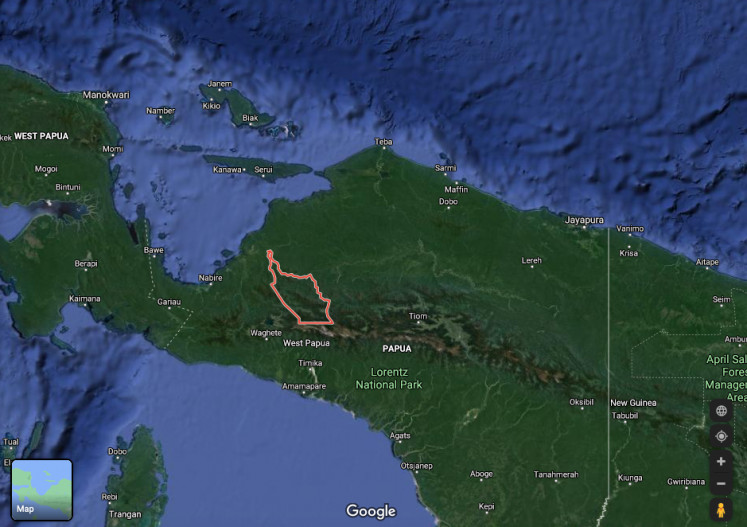Political scandal darkens South Korea's growth prospects
The so-called 'Choi Soon-sil gate,' a political scandal involving President Park Geun-hye, is adding to the growing fears of a serious crisis in the Korean economy, with the scandal shaking the sentiments of foreign investors.
Change text size
Gift Premium Articles
to Anyone
 People watch a TV screen showing the news program about South Korean President Park Geun-hye's apology, at Seoul Railway Station in Seoul, South Korea, Oct. 25, 2016. (AP/Lee Jin-man)
People watch a TV screen showing the news program about South Korean President Park Geun-hye's apology, at Seoul Railway Station in Seoul, South Korea, Oct. 25, 2016. (AP/Lee Jin-man)
T
he so-called 'Choi Soon-sil gate,' a political scandal involving President Park Geun-hye, is adding to the growing fears of a serious crisis in the Korean economy, with the scandal shaking the sentiments of foreign investors.
The scandal is viewed to be impacting not only the financial market but also the real economy that is already trapped in protracted sluggish growth, casting a gloom on the overall economic outlook for next year.
This week alone, Kospi, the country’s main stock trading index, shed 33.85 points as of Wednesday in the wake of heightened uncertainties aggravated by the presidential scandal.
The securities index slid 23.28 points on Tuesday, a day after a local cable news program revealed that Choi, a civilian with close ties with the president, was allegedly involved in editing as many as 44 presidential speeches for major events.
Although local analysts have mixed views on the scandal having a direct impact on the financial market, some are concerned that the burgeoning scandal could lead to further confusion in economic policies.
“Foreign investors can regard such political uncertainties as a risky factor for Korea’s economic growth,” said Lee Sang-jae, head of research at Eugene Investment & Securities.
“Since it is not a problem that can be fixed overnight, investors’ jitters might keep mounting,” said Lee.
On Tuesday, foreigners sold off about 1.5 trillion South Korean won (US$1.31 billion) worth of local shares listed on the Kospi, as the scandal spiraled into a national crisis.
“Foreigners sold significant amounts of futures on Monday, and that selling spree continued the following day, largely due to their concerns about the political situation,” said Park Sang-hyun, head of investment strategy at HI Investment & Securities.
“If similar situations occur more frequently in the political circle, the government might lose the power to push for its policies, and this will never look good to foreign investors,” Park added.
Since there was no major announcement of economic indicators this week, the Choi Soon-sil gate might have played a part in affecting the investors’ sentiments, the analysts said.
Such pessimistic sentiments in the financial market of an open economy, such as South Korea, where foreign investors account for around 30 percent of market capitalization, can spread into the real economy and suffocate growth, experts said.
“We need some precise analysis on the impact on the economy in the long run,” said Ju Won, executive director and economist at Hyundai Research Institute.
“But one thing for sure is such a scandal affects the economy in a negative manner,” Ju added.
The institute made a 2.6 percent growth forecast for the Korean economy next year, considering that the country is scheduled to undergo a major political event, the 19th presidential election in December.
“When there is such a big political event, economic growth is usually slow, as politicians and economists tend to focus on distribution rather than growth,” he said.
The Bank of Korea (BOK) shed 0.1 percentage point in its 2017 growth forecast earlier this month, expecting 2.8 percent growth on sluggish domestic consumption, falls in exports and runaway household debt.
“The economy has been barely holding onto weak growth until the third quarter due to various government efforts, but serious questions about the fourth quarter are being raised,” said BOK Gov. Lee Ju-yeol at a meeting on economic trends on Wednesday.









